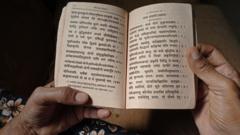The PL-480 initiative allowed India to trade local currency for U.S. grain, inadvertently funneling funds into the purchase of South Asian literature for American universities. This legacy led to vast collections of Indian literature but raises concerns about access and preservation of knowledge in the region.
The Unforeseen Legacy of PL-480: How India's Food Crisis Enriched American Libraries

The Unforeseen Legacy of PL-480: How India's Food Crisis Enriched American Libraries
A historical program that transformed food shortages in India into resources for U.S. academia highlights the complex interplay between international aid, cultural exchange, and library collections.
The aftermath of India's food shortages reverberated through American academic institutions, turning desperation into enrichment. In 1954, the United States launched PL-480, or Food for Peace, a program designed to provide food aid to needy countries while stabilizing U.S. agricultural surpluses during the Cold War. One of the major beneficiaries was India, which faced famine and food insecurity, allowing it to procure U.S. grain using local currency. In an unexpected twist, these funds were directed toward purchasing books and other media from Indian publishers, significantly enhancing libraries across the U.S.
Among the prominent institutions, the University of Chicago's Regenstein Library emerged as a treasure trove for South Asian studies. Ananya Vajpeyi, a visiting professor at Ashoka University, recounted the immense value of the South Asia collection, comprising over 800,000 volumes dedicated to the region. This remarkable collection owes its existence to a team of 60 Indian staff recruited in 1959, who meticulously selected books and publications from a diverse and complex literary landscape.
James Nye, director of the Digital South Asia Library at the University of Chicago, noted the lasting impact of PL-480 on the growth of academic collections, which saw an influx of over 633,000 items from India alone by the late 1960s. However, challenges arose regarding the selection of appropriate materials. Originally, the program's scope included a wide range of literary genres, but by the mid-1960s, it narrowed to focus exclusively on scholarly works. This selection process led to the inclusion of crucial historical and cultural texts, preserving a significant part of South Asian heritage.
Despite its benefits, the program's legacy also raising concerns over knowledge disparities. Todd Michelson-Ambelang from the University of Wisconsin-Madison warned that the acquisition of South Asian materials by Western libraries could create gaps in local accessibility. As a result, many researchers in the Indian subcontinent found themselves traveling to Western universities to access this knowledge, raising questions about the long-term preservation of Indian literature.
While many books gathered under PL-480 are still present in the University of Chicago's collections, their existence raises poignant issues about access. Maya Dodd of FLAME University noted that some titles have become scarce in India, preserved only in U.S. libraries, which benefit from stringent conservation efforts. In stark contrast, Indian libraries struggle with preservation due to insects, pests, and inadequate environmental control.
The program's end in the 1980s shifted the responsibility of resource acquisition to American libraries, which now invest significant amounts in sourcing materials directly from India. Despite the challenges, Vajpeyi reflected positively on the outcomes of the initiative, as it facilitated her diverse academic explorations at the University of Chicago.
Ultimately, while PL-480 eased India's immediate food security crisis, it also fostered avenues for cultural exchange, leaving an indelible mark on American libraries and raising ongoing discussions about equity in literary resources and historical archives.
Among the prominent institutions, the University of Chicago's Regenstein Library emerged as a treasure trove for South Asian studies. Ananya Vajpeyi, a visiting professor at Ashoka University, recounted the immense value of the South Asia collection, comprising over 800,000 volumes dedicated to the region. This remarkable collection owes its existence to a team of 60 Indian staff recruited in 1959, who meticulously selected books and publications from a diverse and complex literary landscape.
James Nye, director of the Digital South Asia Library at the University of Chicago, noted the lasting impact of PL-480 on the growth of academic collections, which saw an influx of over 633,000 items from India alone by the late 1960s. However, challenges arose regarding the selection of appropriate materials. Originally, the program's scope included a wide range of literary genres, but by the mid-1960s, it narrowed to focus exclusively on scholarly works. This selection process led to the inclusion of crucial historical and cultural texts, preserving a significant part of South Asian heritage.
Despite its benefits, the program's legacy also raising concerns over knowledge disparities. Todd Michelson-Ambelang from the University of Wisconsin-Madison warned that the acquisition of South Asian materials by Western libraries could create gaps in local accessibility. As a result, many researchers in the Indian subcontinent found themselves traveling to Western universities to access this knowledge, raising questions about the long-term preservation of Indian literature.
While many books gathered under PL-480 are still present in the University of Chicago's collections, their existence raises poignant issues about access. Maya Dodd of FLAME University noted that some titles have become scarce in India, preserved only in U.S. libraries, which benefit from stringent conservation efforts. In stark contrast, Indian libraries struggle with preservation due to insects, pests, and inadequate environmental control.
The program's end in the 1980s shifted the responsibility of resource acquisition to American libraries, which now invest significant amounts in sourcing materials directly from India. Despite the challenges, Vajpeyi reflected positively on the outcomes of the initiative, as it facilitated her diverse academic explorations at the University of Chicago.
Ultimately, while PL-480 eased India's immediate food security crisis, it also fostered avenues for cultural exchange, leaving an indelible mark on American libraries and raising ongoing discussions about equity in literary resources and historical archives.




















